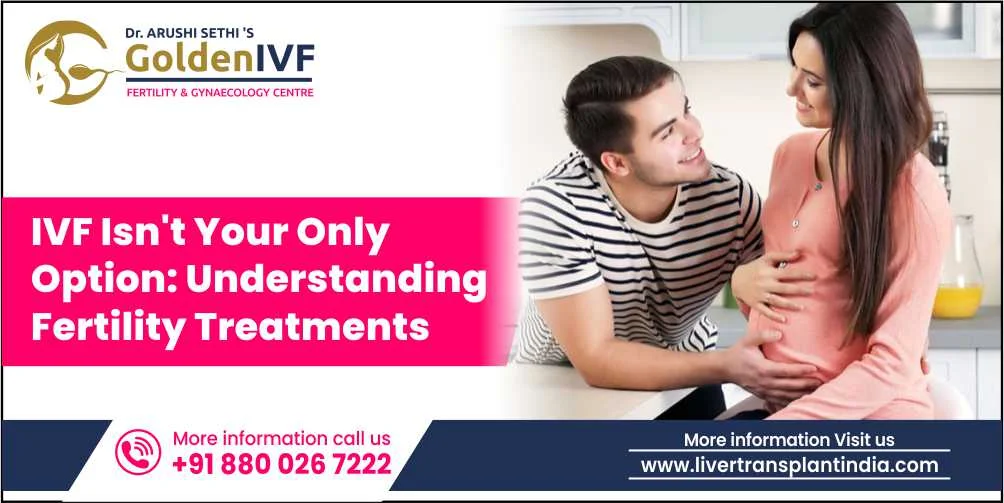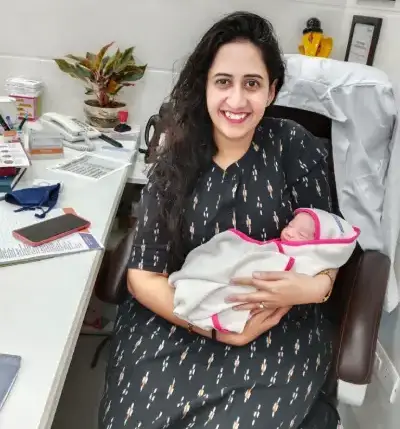Have you ever sat quietly after yet another failed attempt to conceive, wondering if IVF is your only choice left?
Every day, couples across India face the same worry—after trying everything from home remedies to timing ovulation, they start believing that IVF is the only hope. But the truth is far from that.
Yes, IVF is widely known and often spoken about, but several other options are equally effective—sometimes even more suitable—depending on the couple’s condition and history. In this blog, let’s go through the different fertility treatments that are available today. Whether you’ve just started your fertility journey or have been trying for years, this is for you.
The Pressure Around IVF
It’s true—IVF (In-Vitro Fertilisation) has become a household name. From celebrities to your neighbour’s cousin, everyone seems to talk about it. So naturally, when a couple is struggling with infertility, IVF is the first thing they Google or get advised on.
But IVF isn’t always necessary. And it certainly isn’t always the best first step. Fertility treatment is a step-by-step process. What works for one couple may not be suitable for another. Jumping straight to IVF without proper diagnosis and trying other treatment lines is like prescribing surgery for a headache without checking the cause.
Let’s break this idea down and talk about what else is available.
Step One: Basic Evaluation
Before anything, a good fertility clinic will ask you to undergo basic tests—blood work, ultrasound, semen analysis, and a consultation with the doctor. These tests help understand if the problem is with egg quality, sperm count, hormone imbalance, or structural issues like blocked tubes or fibroids.
Skipping this part and heading straight to IVF is like guessing in the dark. So always ensure the foundation is right before taking any major steps.
Option 1: Ovulation Induction
If the issue is irregular ovulation or hormonal imbalance, simple medicines like ovulatory stimulants (to trigger egg release) or aromatase inhibitors (to balance hormones) can help stimulate ovulation. This is one of the most basic and cost-effective treatments. Many women with PCOS (Polycystic Ovary Syndrome) respond well to this line of treatment.
You’ll be given medicines for 5 days in your cycle, followed by an ultrasound tracking to monitor egg growth. Once the egg matures, timed intercourse is advised. It may sound simple, but it has helped thousands of women conceive naturally.
When is it recommended?
- Women with irregular periods
- PCOS
- Couples trying for less than 2 years
Option 2: IUI (Intrauterine Insemination)
This is often the next step if ovulation induction doesn’t work. IUI is a relatively painless and quick procedure. The male partner’s semen is washed and concentrated, and then placed directly into the woman’s uterus around the time of ovulation.
Success rates are modest, but it’s affordable and less physically demanding than IVF.
Who can try IUI?
- Couples with mild male factor issues (low sperm count or motility)
- Unexplained infertility
- Couples who’ve been trying for 2–3 years
Important to note: Most clinics suggest not more than 3-4 IUI cycles. If it doesn’t work by then, the treatment plan is usually changed.
Option 3: Lifestyle & Natural Interventions
This might sound basic, but your daily habits play a big role in fertility. Weight, sleep, stress levels, smoking, alcohol, and junk food—these affect both egg and sperm quality.
Sometimes, a couple may be medically fine, but stress and poor health silently affect the outcome.
Small steps like:
- Maintaining a healthy weight
- Cutting down on smoking/alcohol
- Sleeping on time
- Regular exercise (but not excessive)
- Reducing screen time and improving mental health
…can improve natural chances of conception significantly. Your doctor may even refer you to a fertility dietitian or therapist in such cases. It’s not always about medical treatment—sometimes, it’s about getting back in balance.
Option 4: Surgical Correction
There are situations where a structural issue is silently standing in the way—blocked fallopian tubes, fibroids, polyps, endometriosis, or a uterine septum. These cannot be fixed with tablets or injections. In such cases, a small procedure—laparoscopy or hysteroscopy—is done to correct the problem.
Many women conceive naturally within a few months after such procedures.
When is surgery advised?
- Blocked or swollen fallopian tubes (hydrosalpinx)
- Fibroids pressing on the uterine lining
- Endometriotic cysts
- Uterine polyps or adhesions
Surgery isn’t always needed, but when it is, it can improve the chances without having to go through IVF directly.
Option 5: Treating Male Fertility Issues
Often, the focus of fertility treatment remains on the woman. But male factor infertility is equally common. Low sperm count, poor motility, infection, or varicocele (enlarged veins in the scrotum) can significantly reduce chances.
Depending on the condition, treatment may include:
- Supplements and antioxidants
- Hormonal medicines
- Lifestyle changes
- Surgery (like varicocelectomy)
- Antibiotics for infections
Ignoring the male side or just repeating semen analysis again and again without real treatment is a mistake many couples unknowingly make.
When IVF Becomes Necessary
Yes, there are situations where IVF is needed. But these are usually after trying other methods or when conditions are such that natural conception is nearly impossible.
Some examples:
- Both fallopian tubes are blocked
- Severe male infertility
- Genetic issues needing embryo testing
- Repeated failed IUI cycles
- Older women with low ovarian reserve
In such cases, IVF gives the best chance. But even then, it’s important to have it done at a good centre, where full care is taken of each step—egg quality, sperm selection, embryo development, and transfer technique.
Emotional and Financial Angle
Let’s be honest. Fertility treatments aren’t just about medicines. The emotional toll, the monthly cycles of hope and disappointment, and the rising costs—everything adds up. Couples often lose patience and feel like they are running in circles.
That’s why it is so important to have a doctor who listens, explains clearly, and gives you step-by-step advice rather than pushing you into expensive treatments too soon.
At Golden IVF Fertility and Gynaecology Centre, we make sure you understand your treatment plan. Because it’s not about pushing procedures. It’s about helping you take one step at a time—with clarity, confidence, and calmness.
Putting It All Together
Every couple’s fertility journey is unique. IVF is a wonderful advancement in medicine, but it’s not the first—or only—step for everyone. Many simpler, affordable, and less stressful options might be a better fit if planned well. The key? Getting the right guidance at the right time.
If you’re unsure about your next move, don’t assume IVF is your only choice. Talk to a doctor who looks at the whole picture, not just one solution.
Visit Dr. Arushi Sethi at Golden IVF Fertility and Gynaecology Centre. Whether it’s your first visit or you’re reconsidering after setbacks, we’re here to listen and guide you with care. Book your appointment today and take the right first step—not just the biggest one.


